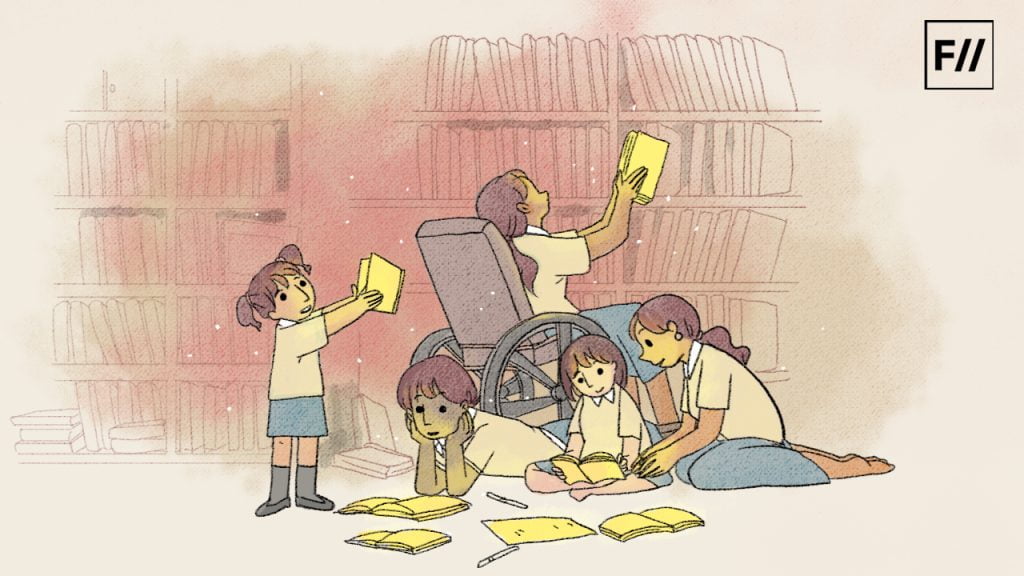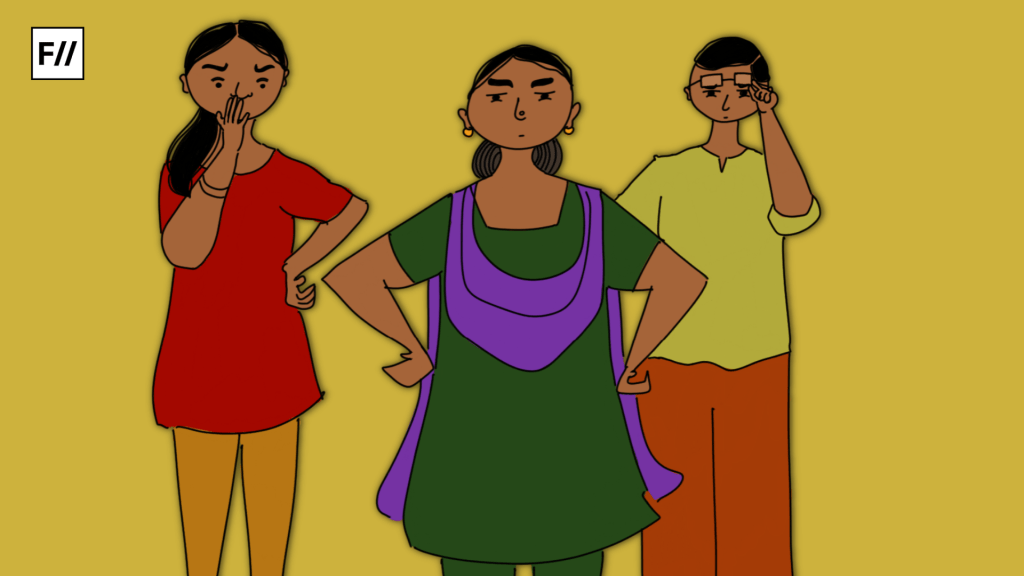It was my fourth-grade summer vacation. I was talking to my seventeen-year-old cousin when he suddenly asked, “Acha, tell me, are you a feminist?” Though my understanding of the word was limited, I nodded yes. He smirked and retorted, “You must be a radical feminist since you are so boldly announcing you are one.” Accepting my ignorance about the term ‘radical,’ I replied that I don’t mind being called a radical feminist if it means that I stand for women’s rights. He went on to lecture me on how “feminism-sheminism” will never do me any good.
“Tui amader theyke durey shorey jabi,” he warned, “tui r amader thakbina” (you will distance yourself from the family and no longer remain ours). His words rang in my ears for the rest of my trip, so much so that I picked up my pocket dictionary as soon as I reached home. My introduction to feminism therefore was accompanied by a warning that promised isolation and rejection from people.
Over the years, I have revisited this conversation on multiple occasions, especially on the days that I lost ‘friends,’ because I chose to stand by my beliefs. The path towards feminism is an isolating one, but it is one that I will continue to choose over and over again.
Small acts of resistance
I grew up in a small town in Assam where people enjoyed the comfort of familiar ideologies. Choosing to be a feminist was therefore a long-drawn battle that began with small arguments with my classmates over ‘subtle,’ sexist comments. Finding it difficult to discover like-minded people in the class, I resorted to the comfort of books. Reading enabled the discovery of newer possibilities of resistance and defiance. The books I was consuming from the school library were not revolutionary, but they helped me imagine the world beyond the boundaries of my town.

Books helped me detect the need to convince the P.T. teachers to let the girls claim the bigger field once in a while to play football and cricket. Books provided the courage to boldly announce, ‘Sir, I am on my period,’ when a teacher attempted to embarrass me for taking more than five minutes in the washroom. Books inspired me to bring together some of my classmates to organise group reading sessions, ‘picnics,’ inside the classroom and drawing and writing competitions. These small attempts to do things differently played an important part in shaping the feminist I am still learning to be.
Internalised contradictions while being a feminist
Internalised misogyny within a person from a small town festers in unnoticed forms. For a long time, I was unaware of the patriarchal gaze that I often employed to character-assassinate seniors in school for wearing makeup or folding their skirts short. “Neatness” competitions during assemblies did not strike me as castist or racist because my joy of being declared the winner clouded my judgement. I hated my eyeglasses because the films told me that bespectacled women cannot be ‘sexy.’ It took me years to reign this internalised gaze because the people who surrounded me in my formative years shared the same prejudices.

Fortunately, I had the privilege of being befriended by three amazing girls who shared my interests. We discussed and debated grim issues: problems no one else talked about and issues outside the realm of the school curriculum. Through their friendship, I found solace in being ‘different.’ Though othered and sneered at by the rest of the class, we helped each other work towards discarding our internalised prejudices and fighting small fights of resistance.
The frustration of justifying the need for feminism
One day during the lockdown, my phone buzzed as my school alumni Whatsapp group flooded with texts. What seemed like benign texts wishing one of my classmates on International Nurses Day were sexist mockery and bullying. Unable to remain a silent bystander, I intervened to reason with them. What followed was a barrage of texts asking me to “calm down” and not make their ‘harmless,’ jokes about feminism.

One of my classmates from the group took the liberty to text me personally, to explain how the term “feminism” was coined by a man, which according to him is enough proof of the fact that men ‘care,’ about women. He argued that since women have voting rights and have retained them for many years in this country, there is no real need for feminism. I debated for several hours, only to realise that he was not willing to change his opinion simply because feminism was not his necessity. He was against the movement because the tipped scale benefits him.
My everyday realities on the other hand depend heavily on the success of the feminist movement. Feminism fights for my freedom to live to the truest potential.
Evolving as a feminist
I will perhaps never say that my journey of evolving as a feminist has come to an end. The old patriarchal systems co-exist and find expression in newer forms that continue to make marginalised lives difficult. ‘Dark humour,‘ no longer appeals to me as funny because they have time and again been used to desensitise us to serious issues. As a consumer of social media content, I continually question my choice of content while trying to understand the sudden surge of regressive content that promotes lifestyles that aggressively seek to situate women within the domestic space.
My journey towards accepting feminism was riddled with hurdles. My cousin’s words have stayed with me as a constant reminder of the loneliness that my ideologies at times engender.
As a feminist, my strength lies in my ability to question, unlearn and relearn. It also depends on the understanding that my idea of feminism may not be identical to someone else’s. What truly matters is one’s loyalty to the core ideal of feminism, which aims for equality amongst all.
My journey towards accepting feminism was riddled with hurdles. My cousin’s words have stayed with me as a constant reminder of the loneliness that my ideologies at times engender. I no longer enjoy films, jokes, art or books that continue to ascribe to sexist stereotypes. However, the repeated news of violence against women and other marginalised people and subtle and overt forms of sexism keep reminding me of the necessity of feminism. Until the day the scale is restored to its balance, I will keep identifying as a feminist.
About the author(s)
Madhusmita Mukherjee (she/they) is a queer feminist writer and photographer from Assam who is passionate about advocating gender equality and social justice. She completed her postgraduation in English from the University of Delhi (2022-24). Her academic interest lies in gender studies, media memory and cultural studies. Her recent publication features in the Zubaan anthology Riverside Stories: Writings from Assam edited by Banamallika.






This is a very relatable story, Madhusmita. I admire how you stayed strong even when others didn’t understand. Your journey shows how important it is to keep learning and standing up for what’s right.
https://xrtechgroup.com